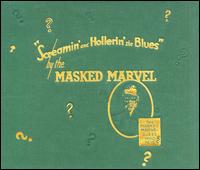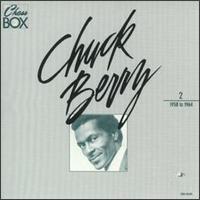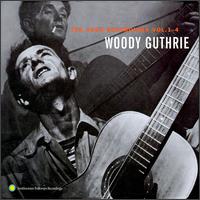Screamin' and Hollerin' the Blues
 Screamin' and Hollerin' the Blues / by the Masked Marvel [i.e. Charley Patton]
Screamin' and Hollerin' the Blues / by the Masked Marvel [i.e. Charley Patton]M1630.18.P37 S37 2001
Perhaps the most sumptuous, nay incredible, box set package ever devised for a blues artist, this lavish production contains seven CDs that not only contain everything Patton recorded as a soloist, but a ton of peripheral tracks to which he contributed or was associated. Yes, this has all 54 known extant Patton performances (including four unissued alternate takes), but that is, quite literally, not the half of it. There are also cuts recorded by other acts at Patton's sessions, including Walter Hawkins, Edith North Johnson, Henry Sims, Willie Brown, Son House, Louise Johnson, the gospel quartet the Delta Big Four, and Bertha Lee. Some of these he played on; some of them he might have played on; and some of them he didn't play on, though he knew (or might have known, anyway) the musicians. There are even a couple of test recordings of Paramount talent scout H.C. Speir reading headlines, which takes even this sort of fanaticism to the extreme, but why not the whole nine yards, right? Then there's an entire disc of tracks by other blues artists, spanning 1924 to 1957 (though mostly weighted toward the early years of that period), spotlighting songs that were related to Patton's repertoire, or inspired in some way by songs in his discography. That CD includes some pretty big names, like Ma Rainey, Furry Lewis, Tommy Johnson, Howlin' Wolf, Son House, Joe Williams, and even the Staple Singers, though room's also made for unknowns, including one "Blues" by Unidentified Convict. And then there's an entire disc of interviews about Patton with Howlin' Wolf, Rev. Booker Miller, H.C. Speir, and Pops Staples; the Rev. Booker Miller portion is more entertaining than most such spoken recordings, as he occasionally plays some guitar himself to illustrate points. Patton's own tracks are consistently inspired Delta blues, though the sound quality inevitably varies widely, sometimes coming through quite clearly, at other times fighting a wall of static. One's interest in the non-Patton selections, other than those on the solid CD of Patton-related tunes and Patton-inspired performers, might vary. Certainly the Son House 1930 recordings (including "Preachin' the Blues") are classic Delta blues songs in any setting, as are the far more obscure ones by Willie Brown. However, others, such as the ones by Edith North Johnson and the Delta Big Four, bear vaudevillian jazz and gospel influences that Delta blues fans might not take a shine to. The non-Patton tracks, too, sometimes suffer from unavoidably poor sound quality due to the extremely rough shape of the only surviving original copies. On top of all this, the packaging is extraordinary by any measure, and would take a lengthy review in itself to even cursorily summarize. Suffice it to say that if you're a serious Patton fan (and it's hard to imagine you'll get this if you're not), you're in for several hours of entertainment even when the CDs aren't in the stereo. The set is packaged like a vintage, full-sized photo album, in the manner "albums" of discs were assembled prior to the invention of the 33 1/3 RPM LP, with slots for each of the seven CDs. There are 128 pages of portfolio-sized liner notes, including essays on Patton and his records, transcriptions of all of the lyrics, stories behind most of the songs/tracks, a "thematic catalogue" of Patton's music, photos, reproductions of old advertisements for 78s, repros of the labels on the original 78s, even an interview with a noted bluesologist about collecting original releases from the artist. Thrown in is the complete 112-page book that John Fahey wrote about Patton in 1970 (an actual book, separate from the liner notes) as part of a series of monographs for Blues Paperbacks, and a reprint of the liner notes Bernard Klatzko wrote for the first Patton compilation, The Immortal Charlie Patton.Due to the expense and zealous completism of this release, most blues fans will be content to limit themselves to an intelligent single-CD compilation of Patton's work, such as Yazoo's Founder of the Delta Blues. If you have any serious hunger to go beyond that, though, and are wondering whether to splurge on this museum-quality piece — do it. It truly is the last word, and one of the most impressively packaged box sets in all of popular music. ~Richie Unterberger, All Music Guide
Listen to excerpts from Screamin' and Hollerin' the Blues Disc 1
Listen to excerpts from Screamin' and Hollerin' the Blues Disc 2
Listen to excerpts from Screamin' and Hollerin' the Blues Disc 3
Listen to excerpts from Screamin' and Hollerin' the Blues Disc 4
Listen to excerpts from Screamin' and Hollerin' the Blues Disc 5
Listen to excerpts from Screamin' and Hollerin' the Blues Disc 6
Listen to excerpts from Screamin' and Hollerin' the Blues Disc 7

The Chess Box / Chuck Berry
M1630.18.B49 C4 1988
M1630.18.B49 C4 1988
Over the course of three compact discs, The Chess Box contains most of the highlights from Chuck Berry's career, including all of the hit singles. In addition to the familiar items, which are all included here, there are numerous tracks that are lesser-known but equally as good. That's particularly true on the stellar first two discs, where album tracks, B-sides, and forgotten singles like "Downbound Train," "Drifting Heart," "Havana Moon," "Betty Jean," "Bye Bye Johnny," "Down the Road a Piece," and "The Thirteen Question Method" get equal space with "Maybellene," "Thirty Days," "No Money Down," "Roll Over Beethoven," "Too Much Monkey Business," "Brown Eyed Handsome Man," "School Day," "Rock & Roll Music," "Sweet Little Sixteen," "Johnny B. Goode," and "Carol." Some serious fans, however, also found disc one, and especially the earlier songs on that disc, to be very controversial; part of the intrinsic nature of Berry's music was the sheer noisiness of the songs — tracks like "Maybellene," "Thirty Days," "You Can't Catch Me," and "Brown Eyed Handsome Man" insinuated themselves into listeners' consciousness over the radio and on the jukebox with their sheer raucous, in-your-face sound (frequently near overload). But at the time The Chess Box was done, the philosophy about CD mastering was to clean up the noise in original recordings whenever it was too pronounced, lest the "hot" digital sound make the track too harsh. (Note: this "problem" especially afflicted "Layla" by Derek & the Dominos, so much so that the producers of the Clapton box remixed the song). Thus, the first 15 or so tracks on the first disc of The Chess Box may sound too "clean," lacking some of the raw edge from their vinyl editions. On the plus side, the detail revealed — every note, and even the action on the guitar on the opening of "Roll Over Beethoven" — is always interesting, and occasionally fascinating, and it is difficult to complain too loudly about hearing Johnnie Johnson's or Lafayette Leake's piano, or Willie Dixon's upright bass in such sharp relief. Additionally, for many years this set had the only undistorted CD version of "Come On" — a relatively minor Berry song, but one that provided the Rolling Stones with their debut release — that you could find, but potential purchasers should also be aware of the compromise in the sound. That caveat aside, the programming manages to get in most of the best album cuts, including tracks like Berry's hot cover of "House of Blue Lights" and the "Memphis Tennessee" "sequel" "Little Marie," though not quite enough material from 1964-1965. And toward the end of the set, the quality of the material begins to sag a bit, but there are still forgotten gems like "Tulane" that prove Berry's songwriting hadn't completely dried up. The now out of print Great Twenty-Eight collection remains the definitive single CD hits collection, and the audio quality on MCA's two-CD Anthology, released a dozen years later, is superior, but The Chess Box offers a flawed but near essential overview of his work for any serious fan, either of Chuck Berry or rock & roll. ~Bruce Eder, All Music Guide
Watch Mia Wallace and Vincent Vega twist to Chuck Berry's "You Never Can Tell"
 Woody Guthrie: The Asch Recordings Vol. 1-4
Woody Guthrie: The Asch Recordings Vol. 1-4M1629.G88 W6 1999
Woody Guthrie's Asch Recordings, Vol. 1-4 is another shining example of Smithsonian/Folkways' ability to create a historically important document that is both fun and enriching. Combining four separate compilations (This Land Is Your Land: The Asch Recordings, Vol. 1, Muleskinner Blues: The Asch Recordings, Vol. 2, Hard Travelin': The Asch Recordings, Vol. 3, and Buffalo Skinners: The Asch Recordings, Vol. 4) into one box, Smithsonian/Folkways presents a fairly complete overview of Guthrie's career. The collection features deep forays into his union songs, political and social issue songs, cowboy and outlaw songs, and early country and frontier ballads, with each CD separated into specific themes. The liner notes are intelligently written but never dry, going through track by track, bringing to light Guthrie's warm contributions to American folksongs. In listening to the set as a whole, the only question left is "where is Guthrie's comedy album?" His biting humor on songs like "Talking Hard Work," "Ladies Auxiliary," "Howdjadoo," and "Mean Talking Blues" tell of a wry and witty side of the activist that would fit alongside his topical children's albums nicely. Each of these CDs are available individually, but purchasing the box set gives the listener a more well-rounded experience and makes more sense economically. ~Zac Johnson, All Music Guide
Listen to Bob Dylan's poem "Last Thoughts on Woody Guthrie":
A four-disc box set spanning Eric Clapton's entire career — running from the Yardbirds to his '80s solo recordings — Crossroads not only revitalized Clapton's commercial standing, but it established the rock & roll multi-disc box set retrospective as a commercially viable proposition. Bob Dylan's Biograph was successful two years before the release of Crossroads, but Clapton's set was a bona fide blockbuster. And it's easy to see why. Crossroads manages to sum up Clapton's career succinctly and thoroughly, touching upon all of his hits and adding a bevy of first-rate unreleased material (most notably selections from the scrapped second Derek and the Dominos album). Although not all of his greatest performances are included on the set — none of his work as a session musician or guest artist is included, for instance — every truly essential item he recorded is present on these four discs. No other Clapton album accurately explains why the guitarist was so influential, or demonstrates exactly what he accomplished. ~Stephen Thomas Erlewine, All Music Guide
Watch Clapton perform "Layla" at Live Aid

0 Comments:
Post a Comment
<< Home